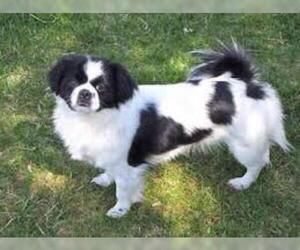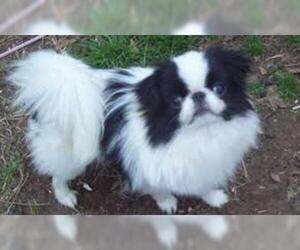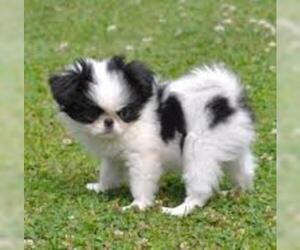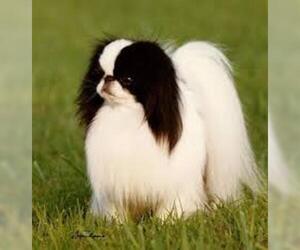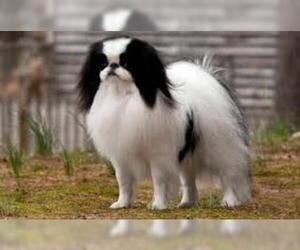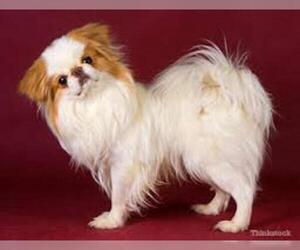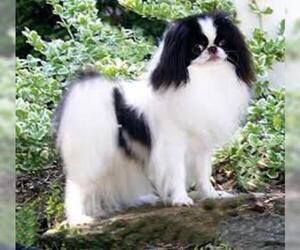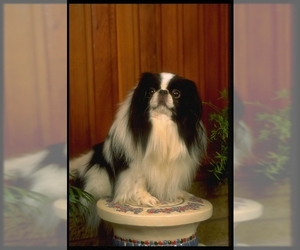
All about Japanese Chin dog breed
A.K.A. :Chin, Japanese Spaniel, Chin Dog, Chins, Japanese Chins, Japan Chin
Size
Grooming requirements
Exercise requirements
Good with other dogs
Watchdog ability
Energetic
Training requirements
Playful
Affectionate
Good with other pets
Good with children
Good with strangers
Winter
Summer
Healthiness
Protective
Life Span
| Pure Breeds | Member |
| Breeds A - Z | J |
| Breeds by Group | Companion Toy |
| Breeds by Trait | Good With Kids Hypoallergenic Low Shedding |
| Overview: | The Japanese Chin is an elegant and charming toy breed, originating not from Japan as its name suggests, but likely from ancient China, eventually becoming a prized companion of Japanese nobility. Physically, they are distinctive with their broad, rounded head, short muzzle, and large, expressive eyes that often give them a surprised or inquisitive look. Their single coat is long and silky, forming an impressive ruff around the neck, and typically comes in black and white or red and white color combinations. Temperamentally, Chins are known for being affectionate, intelligent, and often described as having a "cat-like" quality due to their fastidious grooming habits and playful antics. They are generally quiet and polite, making them an excellent choice for apartment living and families with older, respectful children. While generally healthy, potential owners should be aware of a predisposition to patellar luxation, heart murmurs, and breathing difficulties typical of brachycephalic breeds. Their moderate exercise needs and loving nature make them wonderful, devoted companions. |
F.A.Q.
All You Need to Know About the Japanese Chin Breed
The Japanese Chin is an elegant, charming companion originating from ancient Japan, renowned for its distinctly aristocratic appearance and delightful temperament. These captivating toy dogs are characterized by their large, expressive eyes, flat face, and luxurious, silky coat, often in black and white or red and white combinations. They are known for their gentle, affectionate, and intelligent nature, making them excellent family pets and ideal for apartment living due to their relatively low exercise needs. A short daily walk or indoor play is usually sufficient. Grooming requirements are moderate; regular brushing keeps their beautiful coat tangle-free. While generally healthy, potential adopters should be aware of common brachycephalic issues, like respiratory concerns, and patellar luxation. Their playful yet serene demeanor makes the Japanese Chin a wonderful, devoted companion for various lifestyles.The average weight of a Japanese Chin is typically between 4 to 9 pounds. This is considered the healthy weight for a Japanese Chin adult. While there isn't a significant weight difference between males and females, individual size and bone structure can cause some variation within this range.
Curious about the Japanese Chin height? These delightful companion dogs are known for their compact size. The average size of a Japanese Chin, measured at the shoulder, typically falls between 8 to 11 inches tall.
While there isn't a significant difference in height between males and females, individual genetics can play a role. Some Chins may be slightly shorter or a bit taller within this range. This makes them a fantastic choice for those looking for a small breed that's easy to handle and perfectly suited for apartment living or smaller spaces.So, if you're asking "how tall is a Japanese Chin?", you can expect a charming little companion that comfortably fits in your lap!Japanese Chin colors span a beautiful spectrum, with AKC recognized Japanese Chin colors primarily being black and white, red and white, and lemon and white. These are the traditional and most common coat types you'll encounter. Red can range from a light fawn to a rich mahogany.Beyond the standard, you might also find sable and white and brindle and white variations, which are also generally accepted by major kennel clubs. Sable features black tipping on red hairs, while brindle shows tiger-like stripes over a lighter background.For those seeking more exotic Japanese Chin variations or rare coat types, there are blue and white and chocolate and white Japanese Chins. These colors are not officially recognized by the AKC and are much rarer, often resulting from dilute genes. Blue is a dilute black, appearing as a greyish-blue, and chocolate is a dilute liver or brown. While stunning, these rare Japanese Chin colors may not be eligible for conformation showing and can sometimes command higher pricing due to their rarity. You will not find merle or lilac in purebred Japanese Chins. Always verify a breeder's claims and health test results when considering these less common variations.
The Japanese Chin personality is characterized by a charming blend of affection, elegance, and playfulness. They are generally friendly and devoted, forming strong bonds with their families, showcasing their loyalty. These small dogs are highly sociable, enjoying the company of their human companions and often greeting visitors with a characteristic "Chin spin." Their adaptability to apartment living is excellent, as they are primarily indoor dogs and require moderate exercise. While typically gentle and patient, their small size means supervision is recommended when interacting with very young children; they generally do well with older, considerate children. With proper introduction, they usually get along well with other pets, including other dogs and cats, due to their non-aggressive and adaptable temperament of Japanese Chin. They are known for being intelligent, making them relatively easy to train, and their quiet nature makes them suitable for various living situations.
The Japanese Chin temperament is generally delightful and charming, making them excellent companion dogs. They are known for being affectionate, intelligent, and possess a regal yet playful demeanor.Friendliness & Sociability: Japanese Chins are typically very friendly and sociable with their families and often warm up to strangers quickly. They thrive on human companionship and can become deeply attached to their owners.Loyalty: They are fiercely loyal and devoted, often following their owners from room to room. This strong bond contributes to their desire to be involved in all family activities.Adaptability to Apartment Living: Their small size, relatively low exercise requirements, and indoor-oriented nature make them exceptionally well-suited for apartment living. They are content with short daily walks and indoor play.Behavior with Children: While generally good-natured, their delicate bone structure means they are better suited for homes with older, respectful children who understand how to interact gently with a small dog. They can be overwhelmed by boisterous play.Behavior with Other Pets: Japanese Chins usually get along well with other pets, especially if introduced properly. They can live harmoniously with other dogs and even cats, often enjoying the company.Tendencies: While generally eager to please, they can exhibit a stubbornness streak, particularly during training, requiring patience and positive reinforcement. They are also quite sensitive to their owner's moods and can become withdrawn if they sense tension or are scolded harshly. They prefer a calm and loving environment.Overall, the Japanese Chin personality traits include being a graceful, loving, and amusing companion, happiest when cuddled up with their favorite people.
Japanese Chin Care: Daily Maintenance & Health TipsJapanese Chin care is generally moderate, making them suitable for various households. Their long, single coat requires regular grooming needs to prevent tangles and maintain its luster. Expect brushing 2-3 times a week, and occasional baths as needed. While they don't have an undercoat, seasonal shedding occurs.This low-energy dog breed has minimal exercise limitations. Short, daily walks or indoor play sessions are usually sufficient to meet their activity needs. They are prone to overheating due to their brachycephalic (short-nosed) anatomy, so avoid strenuous exercise in hot or humid weather.Dietary considerations for Japanese Chins are similar to most small breeds. Feed a high-quality, small-breed dog food appropriate for their age and activity level. Portion control is crucial for weight management, as they can easily become overweight.Due to their facial folds and ear structure, wrinkle and ear cleaning are essential. Regularly clean facial wrinkles with a damp cloth to prevent skin irritation and infections. Check and clean their ears weekly to prevent wax buildup and ear infections.Their brachycephalic anatomy also makes them susceptible to climate sensitivity. Protect them from extreme heat and cold. Air conditioning is vital in warm climates, and a warm sweater may be needed in winter.Common health tips for Japanese Chin include diligent dental care to prevent periodontal disease – brush their teeth several times a week. Be aware of potential skin issues within their wrinkles if not cleaned properly. Regular veterinary check-ups are key to addressing potential health concerns early.
Japanese Chin Activity Level: How Active Are Japanese Chin?The Japanese Chin activity level is generally considered moderate to low, making them well-suited for a variety of households. While they enjoy short bursts of play and can be surprisingly agile, they are not a high-energy breed that requires extensive daily exercise. Most Japanese Chin will be content with 20-30 minutes of gentle daily activity, such as a leisurely walk around the block or engaging playtime indoors.Their playtime preferences often involve chasing toys, short games of fetch, or simply interacting with their human companions. They are very people-oriented and thrive on mental stimulation through interaction rather than solely physical exertion. It’s important to remember their brachycephalic (short-nosed) anatomy when considering their exercise needs. Due to their flattened faces, Japanese Chin are susceptible to overheating and respiratory difficulties, especially in warm weather or during strenuous activity. Therefore, intense or prolonged exercise should be avoided. Always supervise them during outdoor play and ensure they have access to shade and fresh water.Japanese Chin typically balance their short bursts of energy with long periods of rest and napping. They are not known for being overly boisterous or destructive if their moderate exercise requirements are met. This breed is more suitable for low-energy households or individuals who enjoy a relaxed pace of life, rather than extremely active families looking for a jogging or hiking companion. Their adaptability makes them excellent companions for apartment living and seniors. When considering a Japanese Chin, understand that their exercise needs are manageable, prioritizing indoor play and gentle walks over intense physical demands.
Japanese Chin Health: What You Need to Know
The adorable Japanese Chin, while generally healthy, has some common Japanese Chin medical issues largely due to its unique brachycephalic (flat-faced) anatomy and delicate build. Understanding these Japanese Chin health problems is crucial for potential owners to ensure a long, happy life for their companion.One of the most significant concerns is Brachycephalic Obstructive Airway Syndrome (BOAS). This is a collection of anatomical abnormalities, including stenotic nares (narrow nostrils), an elongated soft palate, and everted laryngeal saccules, that restrict airflow. Symptoms range from noisy breathing and snoring to exercise intolerance, gagging, and even collapse in severe cases. Owners need to be mindful of brachycephalic dog care, especially avoiding strenuous exercise in heat and humidity.Another frequent issue is heat sensitivity. Due to their brachycephalic airway, Japanese Chins struggle to cool themselves effectively. They can overheat quickly, leading to heatstroke, which is a medical emergency. Always provide a cool environment and limit outdoor activity during hot weather to how to keep Japanese Chin healthy and safe.Skin fold infections (pyoderma) are common, particularly around their facial folds and tail pocket. These warm, moist areas can trap bacteria and yeast. Regular cleaning and drying of these folds are essential preventative measures.Allergies are also a prevalent concern in the breed, manifesting as skin irritation, itching, ear infections, or digestive upset. Identifying and managing allergens, whether environmental or food-related, is key.While not as common as in larger breeds, hip dysplasia can occur, leading to lameness and arthritis. Responsible breeders screen their dogs to reduce its incidence. Additionally, spinal problems, such as patellar luxation (slipping kneecaps), can affect their mobility. Observing their gait and seeking veterinary attention for any signs of discomfort are important.To minimize these common Japanese Japanese Chin health issues, choose a reputable breeder who screens their dogs. Provide regular veterinary check-ups, maintain a healthy weight, offer a high-quality diet, and be vigilant about their breathing and overall comfort. Early detection and management are crucial for how to keep Japanese Chin healthy and thriving.Breed Breakdown: What Experts Say About the Japanese Chin
I would rate the "Size" trait of the Japanese Chin as a 2.The Japanese Chin is a quintessential toy breed, consistently ranking among the smaller companion dogs. They typically stand between 8 to 11 inches tall and weigh a mere 4 to 9 pounds. Their delicate bone structure and petite frame make them appear even smaller. Compared to other companion dogs, even those considered small like a Shih Tzu or Maltese, the Japanese Chin is often on the lower end of the weight and height spectrum. This makes them exceptionally well-suited for apartment living, frequent travel due to their easy portability, and households with significant space constraints. They require very little physical footprint and can thrive in confined environments.
I would rate the grooming requirements of the Japanese Chin at a 6 out of 10. While not as demanding as some long-haired breeds, they aren't truly wash-and-go. Their single, silken coat doesn't mat easily, which is a plus, but it does require regular brushing a few times a week to prevent tangles, reduce shedding, and maintain its luster. They are moderate shedder. Their flat faces mean potential for tear staining around the eyes, necessitating daily wiping to keep the area clean and prevent irritation. Ear cleaning should be done regularly, and nail trimming is crucial as with any dog, usually every 2-4 weeks. Bathing is needed periodically, perhaps every 4-6 weeks, or when dirty, to keep their coat fresh. While not overly prone to skin issues, their brachycephalic (flat-faced) nature can make them susceptible to dental problems and the aforementioned tear staining, which indirectly adds to their care routine. Compared to a short-haired terrier, they require more dedicated coat care, but less intensive professional grooming than a poodle or Shih Tzu.
I would rate the exercise requirements of the Japanese Chin as a 2.The Japanese Chin has very low exercise needs, primarily due to their small size, generally calm demeanor, and brachycephalic (short-nosed) anatomy. Daily activity recommendations usually consist of short, leisurely walks – perhaps 15-20 minutes a day – combined with some indoor playtime. Their energy levels are typically low to moderate, and they are not built for sustained movement. In fact, due to their potential for respiratory issues, vigorous or prolonged exercise, especially in warm weather, should be strictly avoided. They thrive with minimal activity, being perfectly content as lapdogs or enjoying gentle play sessions. While they can participate in very low-impact activities like canine good citizen classes or extremely basic trick training, structured, high-intensity routines are neither necessary nor advisable for their health and well-being. They are very much a breed that prefers comfort and companionship over extensive physical exertion.
I would rate the Japanese Chin's "Watchdog Ability" at a 4.While the Japanese Chin is a highly alert and attentive breed, they are more inclined to provide early warnings rather than active deterrence. They are quick to notice changes in their environment, including unfamiliar sounds or the presence of new people, and will typically respond with a sharp, somewhat high-pitched bark. This barking behavior is consistent and serves well to alert their owners to potential issues. However, their territorial instincts are not particularly strong, and their small size and sweet disposition mean they are unlikely to genuinely deter an intruder beyond the initial vocal alarm. They are more likely to greet a new person with curiosity or a desire for affection once they've deemed them non-threatening, rather than maintaining a protective stance. They excel as "alert systems" within a home environment, effectively signaling that something is amiss, but they are not built for or inclined towards confronting a threat. They are definitely more of a passive companion who will let you know if someone is at the door or walking by, but not a breed that will actively defend the home.
I would rate the "Good with Other Dogs" trait of the Japanese Chin breed a 7 out of 10.Japanese Chins are generally quite agreeable and polite little dogs, and their gentle nature often extends to their interactions with other canines. They are rarely overtly aggressive or dominant and tend to be more observers than instigators in a multi-dog setting. They can coexist peacefully with dogs of various sizes and energy levels, often adapting to the flow of the household. However, their small size and delicate build mean they can be easily overwhelmed by very boisterous or large, unmindful dogs, and they may retreat or become anxious in such situations. While they don't typically require extensive, specialized training to coexist, careful introductions are always beneficial, especially with much larger or more energetic breeds, to ensure their comfort and safety. They thrive in canine company, enjoying the social aspect, but they also appreciate their personal space and are not usually the type to constantly engage in rough-and-tumble play. They are adaptable to multi-dog households but do best when their canine companions are also well-socialized and respectful of their smaller stature.
I would rate the "Energetic" trait of the Japanese Chin at a 3 out of 10.The Japanese Chin is a naturally more laid-back and reserved companion dog compared to many other breeds. While they do enjoy short bursts of playful activity, particularly with their owners, their overall activity level is quite low. They are content with short walks around the block or playing indoors, and do not require extensive physical stimulation to be happy. Their endurance is limited, and they are not suited for strenuous outdoor or athletic activities. This is further impacted by their brachycephalic (short-nosed) anatomy, which can make breathing more difficult during exercise and significantly reduce their stamina and exercise tolerance, making them prone to overheating and respiratory distress with prolonged exertion. They are definitely more of a lapdog than an athlete.
I would rate the training requirements of the Japanese Chin a 5 out of 10.While intelligent, the Japanese Chin possesses a delightful independent streak and a somewhat capricious nature, preventing them from being a "very easy" train. They aren't particularly stubborn in the way some working breeds can be, but their attention span can be fleeting, especially if something more interesting catches their eye. They are generally responsive to commands, especially when food or praise is involved, but their primary motivation is often to please themselves, with pleasing you being a happy coincidence. Consistency is absolutely key; if you're not consistent, they'll quickly learn what they can get away with. Positive reinforcement, with a focus on treats and enthusiastic praise, is highly effective, as they are sensitive and will shut down with harsh correction. They are generally beginner-friendly as long as the owner understands their unique personality and approaches training with patience, humor, and a light touch. While not requiring experienced handling in the sense of a high-drive working dog, an owner who can make training fun and engaging, rather than a rigid chore, will see the best results. Structured routines are beneficial for house-training and basic obedience, but they don't need the intense, rigorous structure some breeds demand.
I would rate the Japanese Chin's "Playful" trait a 7 out of 10.While not in the same league as a Border Collie, the Japanese Chin is surprisingly spirited and enjoys playful interaction. They aren't prone to hyperactive bursts, but they are consistently interested in games and engaging with their human companions. They have a delightful clown-like quality and will often initiate play by prancing, bowing, or gently pawing. They love a good game of fetch (often retrieving with gusto), and are quite responsive to toys, especially those that squeak or can be chased. While they do enjoy a good snuggle session, they are far from being a lazy lapdog and will enthusiastically participate in daily activities, often shadowing their owners and looking for opportunities to be involved. Their attention-seeking behavior is charmingly persistent rather than demanding, often manifesting as a gentle nudge or a hopeful gaze. Compared to many companion dogs, they strike a lovely balance between being spirited and being content to relax, making them a wonderfully adaptable and fun-loving companion.
I would rate the Affectionate trait of the Japanese Chin as a 9.The Japanese Chin is renowned for its deep affection and strong bond with its human companions. They are classic "lap dogs" that thrive on close physical contact, often seeking out a warm lap to snuggle in or a cozy spot beside their owner. Their desire for human companionship is very high; they tend to follow their family members from room to room, preferring to be in the same space as their loved ones. Loyalty is a hallmark of the breed, and they are highly sensitive to their owner's emotions, often offering comfort when sensing distress. They truly flourish when showered with attention and affection, making them incredibly loving and people-oriented pets. While they have an independent spirit characteristic of some toy breeds, their need for connection and their demonstrative affection far outweigh any aloofness.
I'd rate the "Good with Other Pets" trait of the Japanese Chin breed a 9 out of 10.The Japanese Chin is generally known for its delightful and adaptable nature, extending to other animals. They typically get along well with other dogs, often enjoying canine companionship. Their prey drive is quite low, making them surprisingly good with cats, and many Chin live peacefully alongside felines, sometimes even initiating playful interactions. Resource guarding is not a prominent trait in the breed, though individual personalities and early socialization always play a role. They are naturally quite sociable and adaptable, making them excellent candidates for multi-pet households. While early socialization always benefits any dog, the Japanese Chin's inherent sweet and gentle temperament means they often require less intensive training and supervision to coexist peacefully with other animals compared to many other breeds. They are more likely to seek out a comfortable spot near their animal companions than to challenge them.
I'd rate the Japanese Chin's "Good with Children" trait at a 6.While generally a gentle and affectionate companion, the Japanese Chin isn't inherently the most robust or tolerant breed for all family dynamics. Their small size and delicate build make them susceptible to accidental injury from boisterous young children, and they can be easily overwhelmed by constant noise and rough play. They tend to be more patient with older, more considerate children who understand how to interact gently with a small dog. They aren't typically a breed that will endlessly retrieve or engage in rough-and-tumble games. They are more likely to thrive in a home where children are taught to be respectful and calm, and where the dog has a quiet space to retreat to. While they can form strong bonds with their human family, particularly the person who provides consistent care, their tolerance for handling and unpredictable childish behavior is moderate, requiring supervision to ensure both the child's and the dog's well-being.
I'd rate the Japanese Chin's "Good with Strangers" trait a 6.The Japanese Chin is generally polite and tolerant of strangers, rather than overtly effusive. They tend to be more reserved and observe unfamiliar individuals before deciding to engage. While not typically unfriendly or aggressive, their natural inclination isn't to be immediately effusive or jump into a stranger's lap. With proper socialization from a young age, they can become quite comfortable and even charming with guests, often offering a gentle sniff or a quiet acknowledgment. They are not prone to excessive barking or guarding behavior with strangers, preferring a more dignified approach. They adapt reasonably well to public or guest-filled environments as long as they feel secure and their owner is present, but they are unlikely to be the life of the party with new acquaintances. Their comfort level with strangers is largely a result of their calm and adaptable nature, but it benefits significantly from consistent positive exposure rather than being a purely inherent, naturally outgoing trait.
I would rate the Japanese Chin's "Winter" tolerance at a 2.This breed exhibits significant sensitivity to cold due to several contributing factors. Their single, silken coat, while beautiful, offers very little insulation against low temperatures. Being a small breed, they have a larger surface area to volume ratio, making them more prone to rapid heat loss. The Japanese Chin also possesses a brachycephalic (short-nosed) anatomy, which further compromises their ability to regulate body temperature in cold weather. This facial structure means they don't efficiently warm the inhaled air before it reaches their lungs, increasing the risk of respiratory issues and making them more susceptible to chilling. They typically have a lean body build with minimal subcutaneous fat to provide an insulating layer. Consequently, the risk of hypothermia is considerable even in moderately cold conditions, and they are generally not equipped to safely enjoy prolonged outdoor activity in anything more than crisp, mild winter weather. Compared to many other companion dogs, the Japanese Chin absolutely requires special care during winter months, often needing sweaters or coats for even short outdoor excursions, and ideally should have very limited exposure to cold temperatures, preferring indoor warmth.
I would rate the Japanese Chin's "Summer" tolerance as a 2.This breed, despite its small size, is quite sensitive to heat due to its brachycephalic (short-nosed) anatomy. Their compacted airways make it much more difficult to pant effectively and efficiently cool their bodies compared to dogs with longer snouts. This significantly impairs their ability to regulate body temperature, placing them at a very high risk of heatstroke, even with moderate exposure to warm temperatures. Outdoor activity should be severely restricted during hot weather, ideally limited to very early mornings or late evenings in shaded, cool areas, and only for short durations. They absolutely require a climate-controlled environment during summer months, meaning air conditioning is essential, and they should never be left outdoors unattended. Compared to most other companion dog breeds, Japanese Chins require substantial special care and vigilance to prevent overheating and heatstroke during the summer.
I would rate the Japanese Chin's "Healthiness" trait as a 7 out of 10.The Japanese Chin is generally considered a fairly robust and long-lived toy breed, often reaching 12-14 years or more. They aren't typically plagued by the extreme breathing difficulties seen in some other brachycephalic breeds, though they can be sensitive to heat and exertion. Responsible breeding plays a crucial role in mitigating issues like luxating patella and early-onset heart conditions, which are the most common genetic predispositions to be aware of. They can also be prone to eye issues due to their prominent eyes, such as cataracts and entropion, and occasional dental problems, a commonality in small breeds. While not high-maintenance in terms of needing extensive medical interventions, they do require consistent preventive care, particularly dental care, and vigilance regarding their eyes and any respiratory changes, especially during exercise or in warm weather. Compared to some companion dogs with more pervasive and severe breed-specific ailments, the Chin is generally healthier, but they aren't without their specific considerations.
I would rate the "Protective" trait of the Japanese Chin as a 3.The Japanese Chin is a breed primarily designed for companionship and lap-sitting. While they are undoubtedly loyal to their owners and highly alert to their surroundings, their protective instincts are largely limited to alarm-barking rather than any meaningful physical defense. They will certainly let you know if someone is approaching, with a surprisingly deep bark for their size, making them decent "doorbell" dogs. However, their territorial instincts are not aggressive, and their reaction to strangers is more often one of curiosity or polite reserve than a menacing posture. They are far too small and gentle to be considered a guard dog in any practical sense. They might be the first to bark at an intruder, but they are absolutely not capable of offering physical protection in a household setting and would likely retreat or seek comfort from their owner in a truly threatening situation. They are loving companions, but definitely not a protective breed.
The Japanese Chin's "Life Span" trait rates an 8 out of 10.This breed is generally considered long-lived compared to many other companion dogs. With an average life expectancy of 10 to 12 years, and often extending to 15 years or even beyond with excellent care, they demonstrate remarkable longevity for their size. While they are a brachycephalic breed, which can sometimes lead to respiratory issues, the severity is often less pronounced than in some other "flat-faced" breeds. Responsible breeding practices have focused on maintaining good health, and owners who provide proper nutrition, regular veterinary care, and manage potential health concerns like patellar luxation or heart murmurs (which can occur but are not universally debilitating) contribute significantly to their extended lifespans. Their relatively robust nature and fewer common debilitating genetic predispositions, compared to some other breeds, further contribute to their excellent longevity.
Japanese Chin Puppies for saleSee all puppies for sale
Japanese Chin Dogs for adoptionSee all dogs for adoption
Japanese Chin BreedersSee all breeders
Similar Dog Breeds for Japanese Chin
Breed Mixes of Japanese Chin
Quick Breed Selector 0 - not important, 1 - smallest, 10 - largest
Variants & Mistakes :Japanese Chun, Japanese Chins, Japanese Shin, Japanese Chih, Japanese Chian, Japanese Chinns, Japanese Khin, Japanes Chin, Japanees Chin, Jappanese Chin, Japanes Chins, Japonise Chin, Japonise Chins, Japaneses Chin, Japaneses Chins, Japenese Chin, Japenese Chins, Japnese Chin, Japnese Chins, Japneese Chin, Japneese Chins, Japaense Chin, Japaense Chins, Jpanese Chin, Jpanese Chins, Jappanes Chin, Jappanes Chins, Japanaise Chin, Japanaise Chins, Japanese Chon, Japanese Chen, Japanese Khan, Japenese Chun, Japenese Shin, Japonais Chin, Japonaise Chin, Japanesee Chin, Japanesse Chin, Jappenese Chin, Jappenese Chins, Japense Chin, Japense Chins, Japonise Chun, Japonise Shin, Japponese Chin, Japponese Chins
